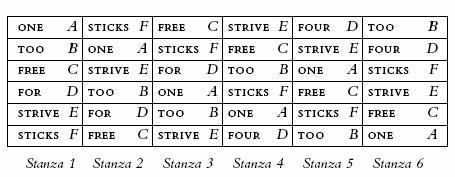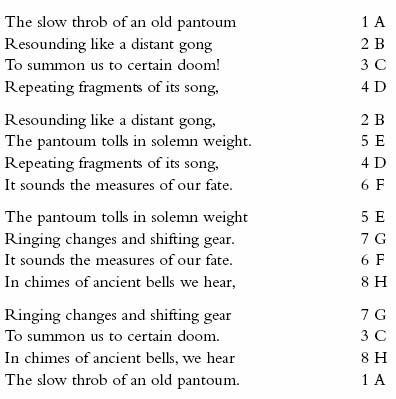The ode less travelled: unlocking the poet within (37 page)

You think that winning sets you
FREE
?
The topmost free end-line is
STICKS
:
No, it’s a poison pill that
STICKS
Then
FOR, WON, TO
and
THRIVE
: The homophone
WON
is perfectly acceptable for
ONE
.
In victory’s throat. Worth striving
FOR
?
The golden plaudits you have
WON
Are valueless and hollow
TOO
The victor’s laurels never
THRIVE
,
Now we do the same to
Stanzas 4, 5
and
6
, shuttling between lines 6, 1, 5, 2, 4, in formula order.
The weeds of self-delusion
THRIVE
On pride: they flourish, thick and
FREE
,
To choke your glory. Thickly
TOO
The burr of disappointment
STICKS
To tarnish all the gold you’ve
WON
.
Is victory worth the fighting
FOR
When friendship’s hand is only
FOR
The weak, whose ventures never
THRIVE
?
I’d so much rather be the
ONE
Who’s always second. I am
FREE
To lose. I know how much it
STICKS
Inside your craw to come in
TWO
But you should learn that Number
TWO
Can have no real meaning,
FOR
We all must cross the River
S
TYX
And go where victors never
THRIVE
,
No winner’s rostrum there, so
FREE
Your mind from numbers: Death has
WON
.
The sixth is the last, after that the whole pattern would repeat. All we have to do now is construct the envoi, which contains all the hero words
12
in a strict order: the second and fifth word in the top line, the fourth and third in the middle line, the sixth and first in the bottom line.
Envoi
In order
TO
improve and
THRIVE
Stop yearning
FOR
success, be
FREE
If this rule
STICKS
then all have
WON
.
It may have seemed a fiendishly complicated structure and it both is and isn’t. The key is to number the lines and follow the 6, 1, 5, 2, 4, 3 formula with (2–5, 4–3, 6–1 for the envoi). If you don’t like numbers you might prefer to
letter
the lines alphabetically and make a note of this scheme:
ABCDEF, FAEBDC, CFDABE, ECBFAD, DEACFB, BDFECA
(
BE/DC/FA
)
If you want to understand the sestina’s shape, you might like to think of it as a spiral. Go back and put the tip of your forefinger on
STICKS
in
Stanza 1
, without taking it off the page move it in an anticlockwise circle passing through 1, 5, 2, 4 and 3. Do it a couple of times so you get the idea. I have made a table which you might find useful. It contains the end-lines of the sestina we built together, as well as ABC equivalents.
Sestina Table

I was rather fascinated by why a sestina works the way it does and whether it could be proved mathematically that you only need six stanzas for the pattern to repeat. Being a maths dunce, I approached my genius of a father who can find formulas for anything and he offered an elegant mathematical description of the sestina, showing its spirals and naming his algorithm in honour of Arnaud Daniel, the form’s inventor, who was something of a mathematician himself, so legend has it. This mathematical proof can be found in the Appendix. If like me, formulae with big Greek letters in them mean next to nothing, you will be as baffled by it as I am, but you might like, as I do, the idea that even something as ethereal, soulful and personal as a poem can be described by numbers…
Sestinas are still being written by contemporary poets. After their invention by the twelfth-century mathematician and troubadour Arnaud Daniel, examples in English have been written by poets as varied in manner as Sir Philip Sidney, Rossetti, Swinburne, Kipling, Pound, W. H. Auden, John Ashbery, Anthony Hecht, Marilyn Hacker, Donald Justice, Howard Nemerov and Kona Macphee (see if you can find her excellent sestina ‘IVF’). Swinburne’s ‘A Complaint to Lisa’ is a
double sestina
, twelve stanzas of twelve lines each, a terrifying feat first achieved by Sir Philip Sidney. I mean surely that’s just showing off…. I shall present two examples to show the possibilities of a form which my sample verse has made appear very false and stagy. The first is by Elizabeth Bishop, entitled simply ‘Sestina’, flowing between ten-, nine-and eight-syllable lines, ending with a final line of twelve:
September rain falls on the house.
In the failing light, the old grandmother
sits in the kitchen with the child
beside the Little Marvel Stove,
reading the jokes from the almanac,
laughing and talking to hide her tears.
She thinks that her equinoctial tears
and the rain that beats on the roof of the house
were both foretold by the almanac,
but only known to a grandmother.
The iron kettle sings on the stove.
She cuts some bread and says to the child,
It's time for tea now; but the child
is watching the teakettle's small hard tears
dance like mad on the hot black stove,
the way the rain must dance on the house.
Tidying up, the old grandmother
hangs up the clever almanac
on its string. Birdlike, the almanac
hovers half open above the child,
hovers above the old grandmother
and her teacup full of dark brown tears.
She shivers and says she thinks the house
feels chilly, and puts more wood in the stove.
It was to be, says the Marvel Stove.
I know what I know, says the almanac.
With crayons the child draws a rigid house
and a winding pathway. Then the child
puts in a man with buttons like tears
and shows it proudly to the grandmother.
But secretly, while the grandmother
busies herself about the stove,
the little moons fall down like tears
from between the pages of the almanac
into the flower bed the child
has carefully placed in the front of the house.
Time to plant tears, says the almanac.
The grandmother sings to the marvelous stove
and the child draws another inscrutable house.
It is not considered
de rigueur
these days to enforce the end-word order of the envoi. This next (also called ‘Sestina’) is by the poet Ian Patterson–wonderful how his end-words slowly cycle their multiple meanings:
Autumn as chill as rising water laps
and files us away under former stuff
thinly disguised and thrown up on a screen;
one turn of the key lifts a brass tumbler–
another disaster probably averted, just,
while the cadence drifts in dark and old.
Voices of authority are burning an old
car on the cobbles, hands on their laps,
as if there was a life where just
men slept and didn’t strut their stuff
on stage. I reach out for the tumbler
and pour half a pint behind the screen.
The whole body is in pieces. Screen
memories are not always as sharp as old
noir phenomena. The child is like a tumbler
doing back-flips out of mothers’ laps
into all that dark sexual stuff
permanently hurt that nothing is just.
I’m telling you this just
because I dream of watching you behind a screen
taking your clothes off for me: the stuff
of dreams, of course. Tell me the old, old
story, real and forgetful. Time simply laps
us up, like milk from a broken tumbler.
A silent figure on the stage, the tumbler
stands, leaps and twists. He’s just
a figure of speech that won’t collapse
like the march of time and the silver screen;
like Max Wall finally revealing he was old
and then starting again in that Beckett stuff.
I’d like to take my sense of the real and stuff
it. There’s a kind of pigeon called a tumbler
that turns over backwards as it flies, old
and having fun; sometimes I think that’s just
what I want to do, but I can’t cut or screen
out the lucid drift of memory that laps
my brittle attention just off-screen
away from the comfortable laps and the velvety stuff
I spilled a tumbler of milk over before I was old.
What seems like a silly word game yields poetry of compelling mystery and rhythmic flow. What appear to be the difficulties of the form reveal themselves, as of course they should, as its strengths–the repetition and recycling of elusive patterns that cannot be quite held in the mind all at once. Much in experience and thought deserves a poetic form that can bring such elements to life.
Poetry Exercise 15
Well, all you have to do now is write your own. It will take some time: do not expect it to be easy. If you get frustrated, walk away and come back later. Let ideas form in your mind, vanish, reform, change, adapt. The repetition of end-words in the right hands works in favour of the poem: it is a defining feature of the form, not to be disguised but welcomed. You might harness this as a means of repeating patterns of speech, as we all do in life, or in reflecting on the same things from different angles.
You can do it, believe me you can. And you will be so
proud of yourself
!
T
HE
P
ANTOUM
